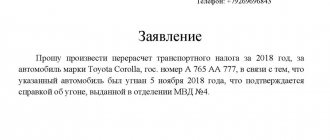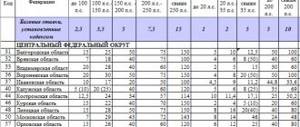Car owners who have old transport tax debts should keep in mind that there is a statute of limitations for this type of payment. This means that tax authorities not always entitled demand repayment of such debts.
This review material will help you understand what the statute of limitations for holding people accountable for non-payment of taxes is and how it differs from the statute of limitations, as well as when a citizen may no longer pay anything to the state.
An advantageous offer from the partners of our portal - Terem Loan! Apply for a loan in the amount of up to 30 thousand rubles for a period of up to 30 days.
100% approval!
Get money
When is a court order issued to collect payment of transport tax?
Most car owners have more than once had to deal with the tax service and the situation that has developed around the calculation and payment of road taxes.
After all, all owners of vehicles are subject to taxation and are required to pay transport tax to the state treasury within the established time limits by the Tax Code of Russia.
The tax authorities of the Federation send notifications to payers in advance, which is a setup for paying tolls.
Due to the fact that the amount of tax is quite impressive, the majority of car owners are trying to outwit the law and the state by evading annual contributions.
As a result, vehicle owners have debts, which later have to be paid by resorting to litigation and sentencing.
What it is
Collection or (return) of transport debt is the process of returning the debt by the owner of the vehicle to the state through the court. There are several stages of legal debt proceedings.
The first is pre-trial claims, when measures are taken against the client through direct communication and the work is carried out without the participation of a legal structure.
An individual or legal entity is offered options to resolve the situation, new time periods for debt repayment are established, and a deferment may be issued due to the reasons expressed and evidence provided about the impossibility of paying the toll.
There is no out-of-court stage for transport tax debt. After all, according to it, tax service employees go to the defaulter and personally hand over certificates and documents about unpaid duties. The tax office sends notifications by mail.
The tax inspectorate immediately proceeds to the last stage of debt collection - by contacting the courtrooms with a statement, which becomes the conditions for issuing a resolution.
That is, this process is carried out for one simple reason: through the court, to prove that the owner of the vehicle owes the debt to the tax inspectorate, and the procedure of “knocking out money” itself is called collection of transport tax.
When is a court order issued to collect transport tax?
All individuals and legal entities are given a certain period to pay transport tax, during which they must pay the specified amount of money.
If the owner of the vehicle fails to pay the duty, the tax authority goes to court, where an application is written to issue a court order.
A court order is issued individually, based on a statement from a government agency to collect the amount of money for the road toll.
A court order refers to both a decree and an executive document. It is made without the participation of both parties and without hearing persons in order to clarify and resolve the problem.
One copy of the document is delivered to the owner of the vehicle who owes transport tax.
A copy of the resolution is considered a notification document about the status of a certain judicial act and the rendering of a decision regarding the case.
If the notifications are ignored, the collection goes to the bailiff service, which forces you to pay the state fee.
The notification must contain detailed information about the amount of the debt, the amount of penalties that were accrued at the time the demand was sent, the debt repayment period, which is determined by local authorities depending on the region and place of residence of the taxpayer.
The time period during which a person or entity is required to pay the toll must be specified.
In other words, the tax inspectorate is obliged to describe in detail its requirements, justify them, set deadlines and confirm the legality of its actions, referring to the Federal laws that regulate the procedure for collecting taxes from Russian citizens.
Payment of debt under a court order for the collection of transport tax must be made by the owner of the vehicle before the expiration of the eight-day period.
The countdown of time begins from the date indicated on the letter, as the date the letter arrives at the specified place. Notifications come from the tax structure with which you are registered.
A letter sent by the tax office to a taxpayer is automatically considered received after six days from the date of sending the notification.
That is, in fact, the government agency does not deal with the problems associated with the late receipt of the letter or its absence at all at the specified address, but immediately makes claims for non-payment. You will have to prove these points.
As stated in Art. 70 of the Tax Code of the Russian Federation that the tax inspectorate has the right to send a notification before the expiration of a three-month period if arrears are detected.
This does not apply to precedents with an audit by the tax service, as a result of which a penalty is sent.
Art. 11 of the Tax Code of the Russian Federation states that the place of residence of the owner of the vehicle is determined by the specified address and place of registration, which took place in accordance with the laws of the Russian Federation.
In the case where a person does not have a permanent place of residence, all letters and notifications are sent to the specified address at the personal request of the car owner by contacting the tax office.
The place of residence of an individual can only be the address where the citizen actually resides. After all, we are well aware of cases where the place of registration and the actual place of residence of an individual do not coincide.
Useful information will help you pay transport tax online through the State Services portal.
Statute of limitations for bringing to justice for non-payment of transport tax
All time periods during which payment must be made are established at the legislative level. In 2021, the limitation period for transport tax for violations of its payment is regulated by Part 1 of Art. 113 Tax Code of the Russian Federation . 3 years have passed from the next day after the end of the tax period or from the day the tax payment violation was committed , then the person who committed the tax violation cannot be held accountable.
Paragraph 1 tsp. 1 tbsp. 113 Tax Code of the Russian Federation
A person cannot be held accountable for committing a tax offense if three years have elapsed from the date of its commission or from the next day after the end of the tax (calculation) period during which this offense was committed and before the decision on bringing to responsibility is made ( statute of limitations).
Thus, the statute of limitations for tax evasion is 3 years . In case of non-payment of transport tax by a legal entity, the three-year period is counted from the next day after the end of the tax period, that is, the year for which the tax was not paid.
Individuals, unlike organizations, do not calculate the amount of tax themselves; the Federal Tax Service does this for them, sending the results of calculations in a tax notice. According to Part 3 of Art. 363 of the Tax Code of the Russian Federation, the notification cannot indicate the amount of tax for more than 3 years preceding the current one. And an individual, in turn, is not obliged to pay debts that were incurred during tax periods earlier than these 3 years.
Clause 3 Art. 363 Tax Code of the Russian Federation
Sending a tax notice is allowed no more than three tax periods preceding the calendar year of its sending.
Taxpayers specified in paragraph one of this paragraph pay tax for no more than three tax periods preceding the calendar year of sending the tax notice specified in paragraph two of this paragraph.
This means that the tax notice you receive in 2021 may only show debts for the previous 3 years, and you are not required to pay taxes accrued before this period .
What to do upon receipt by individuals and legal entities
If you have received the first notification of payment of transport duty, it is strongly recommended not to delay the payment process, but to pay off the debt as soon as possible.
As a result of discovering inaccuracies or errors in calculating the amount of tax, you must contact the tax office with an application for a recalculation of the road duty.
But when you receive a letter from the magistrate in the mail, which talks about non-payment and debts on transport tax, you must immediately pay the duty, do not delay the debt.
This should be done when you agree with the amount of the debt and acknowledge the debt, that it was calculated correctly.
If you do not agree with the transport duty, you have the right to file a counter-statement, which should serve as the basis for canceling the court order.
The tax inspectorate will be required to file a claim in court, which will be considered in the appropriate manner.
When a legal entity or individual receives a notice of non-payment of transport tax from a bailiff, then delaying the payment of the duty is also not a reliable matter.
After all, if you fail to pay off the transport tax through the court, you may lose the right to leave the country until the debt is fully repaid.
If you did not have time to pay the debt, you received a temporary ban on traveling abroad, although after that you have already paid the transport fee - you will have to wait additional time, about a month, for the restrictions to be lifted.
All ignoring of notifications and non-payment of transport tax in the case of a court order also lead to a temporary restriction to cross the border.
You are planning to go to the seaside in the summer, on vacation, but here is such an unpleasant situation - they won’t let you out, and the transport tax has long been forgotten. In this case, the trip will have to be postponed until next year, because the right to cross the border, as mentioned above, will not be quickly restored.
As a result of receiving notices from bailiffs, do not ignore the notices, but pay the transport duty debt on time.
What happens if you don’t pay the transport tax before December 1st?
Photo: RBC
It is also worth considering that the penalty is not calculated daily, although penalties are calculated every day, so the amount of the penalty on the day of payment may be greater than the amount indicated in the receipt documents. You can first pay the main amount of tax and wait a few days until the inspectorate receives the money and recalculates the penalties. The second option is to calculate the penalties by days of delay yourself.
What happens if you pay your debt without penalty?
There are situations when drivers learn about the accrual of transport tax after not owning a car for several years. And such an invoice is issued along with late fees. But motorists often refuse to pay penalties because the tax authority did not notify them in time about the assessment of state duty. It is not uncommon for a driver to pay a receipt for a penalty after some period of time when he does not take into account that a penalty is also accrued for this period. As a result, the tax authorities still owe money.
If the driver decides to pay only the tax itself or forgets to recalculate the penalty, then the overdue debt remains as a debt obligation. Payment of penalties is considered the same obligation as the main amount of transport tax. But when the tax itself is paid, the accrual of penalties stops, and the figure is fixed at the time the debt is repaid.
How to pay transport tax
Today you can pay transport tax in several ways. Motorists can come with a receipt from the tax authority to any bank, and also make payment online - through the State Services website or the application of any bank. If the account on State Services is confirmed, then information about the accrued transport tax will automatically appear in the banking application.
Payment is also possible through the website and application of the Federal Tax Service. You can log in there either through a linked, confirmed account on State Services, or by registering separately. In the latter case, you will first need to personally come to the tax office to obtain registration details. Failure to receive a letter from the tax office is not an excuse for non-payment of state duty or late payment. If the paper has not arrived, the payer must contact the Federal Tax Service at the place of registration to clarify the tax amount.
What is tax amnesty
In 2021, by decree of President Vladimir Putin, a tax amnesty was carried out. Tax debts for a certain period were written off from citizens of the country. The amnesty covers debts incurred before January 1, 2015, as well as penalties accrued on this debt. Debts that arose later than the specified period still had to be paid. The amnesty also affected transport tax for individuals. The Federal Tax Service is still processing submitted applications for tax amnesty.
In essence, a tax amnesty is a state initiative to relieve citizens from tax obligations and responsibility for violating these obligations. After 2021, there were no more similar initiatives in Russia. For now, the only way to avoid collecting transport tax through the court is the statute of limitations. A taxpayer cannot be held accountable if more than three years have passed since the tax violation was committed.
Deadlines for payment of debts
If a letter is received and enforcement proceedings are initiated on the basis of court orders to collect a debt on transport duty, the taxpayer is given an eight-day period to voluntarily pay the amount of money.
If the owner of the vehicle does not meet this period, he is additionally charged a commission of 7% of the total amount of the debt and measures are taken that are provided for by compulsory execution: the inspectorate submits applications for recovery of the house, precious things, and travel abroad is limited.
If you receive a letter with a court order for the collection of transport tax, it is strongly recommended that you pay the toll within the prescribed period. Otherwise, you will be subject to penalties in the form of additional interest and restrictions on movement outside the country.
Where to find out the transport tax by car number, read here.
The transport tax on a leased car is described on the page.
What is the procedure for collecting arrears by tax authorities?
Let's consider the procedure for collecting debt to the budget from a taxpayer step by step.
Step 1. If a tax arrears are detected, the tax authority must issue a demand to the debtor to pay taxes, penalties, fines, and interest within the following terms:
- If a tax arrears are identified during a tax audit, then no later than 20 working days from the moment when the decision made based on the results of the audit came into force (clause 6 of article 6.1, clauses 2, 3 of article 70, clause 1 Article 87, paragraphs 7, 9 of Article 101 of the Tax Code of the Russian Federation).
- If the arrears are identified outside the scope of the taxpayer’s audits, then the deadline for sending the demand will depend on the amount of the debt (clauses 1, 3, article 70, clause 10, article 101.4 of the Tax Code of the Russian Federation). So, with a debt of 500 rubles. or more, the demand must be sent within 3 months from the date of discovery of the arrears, and if the debt is less than 500 rubles. - within 1 year from the date of discovery of the arrears.
Step 2. The taxpayer must fulfill the requirement within the period specified therein (clause 6 of article 6.1, paragraph 4 of clause 4 of article 69 of the Tax Code of the Russian Federation). The minimum period within which he must meet the repayment of arrears on taxes, penalties, etc. is 8 working days from the date of receipt. If the debtor does not fulfill the demand, then:
- According to paragraph 3 of Art. 46 of the Tax Code of the Russian Federation, no later than 2 months after the deadline for fulfilling the requirement, the tax authority makes a decision to collect the debt from the debtor’s accounts opened with banking and credit institutions. Let us note that if we are talking about a consolidated group of taxpayers, then the period for making this decision by the tax authority is extended to 6 months from the moment when the deadline for fulfilling the requirement sent to the responsible member of the group has expired (subclause 5, clause 11, article 46 of the Tax Code of the Russian Federation). The procedure for collecting debt from taxpayer accounts is regulated by Art. 46 Tax Code of the Russian Federation. If there are no funds in bank accounts or there are not enough funds to pay off the debt, the debt is placed in a card index and will be written off as funds become available.
To learn about from which taxpayer accounts debts on taxes and fees can be collected, read the material “From which accounts can tax authorities collect?” .
Step 3. If it is not possible to collect the debt at the expense of the debtor’s funds, then:
The inspectorate, no later than 1 year after the end of the deadline for fulfilling the requirement to pay the debt, makes a decision on its collection at the expense of the taxpayer’s property (clause 7 of article 46, clause 1 of article 47 of the Tax Code of the Russian Federation). In this case, foreclosure can be applied to both movable and immovable property. After making such a decision, the Federal Tax Service has the right to seize him (Article 77 of the Tax Code of the Russian Federation). Collection of arrears, penalties, etc. at the expense of property is carried out in the manner prescribed by Art. 47 Tax Code of the Russian Federation. This decision is carried out by bailiffs. To do this, the Federal Tax Service sends them a resolution on the collection of property. Bailiffs have the right to seize the debtor's assets, evaluate them, seize and/or transfer them for storage and other measures provided for by the Law “On Enforcement Proceedings” dated October 2, 2007 No. 229-FZ. If the debt cannot be repaid within 2 months, the bailiffs transfer the seized property of the debtor to a special organization for sale.
Step 4. If the above measures do not lead to full repayment of the debt, the bailiffs issue a resolution on the return of the writ of execution, and the Federal Tax Service, on the basis of this document, makes a decision on the bankruptcy of the company or individual entrepreneur (clause 4.1, clause 1, article 59 of the Tax Code of the Russian Federation).
Read more about the collection procedure here.
If the amount of arrears exceeds 5 million rubles. or the debt is collected from a consolidated group of taxpayers, then the Federal Tax Service has the right to go to court:
- After 2, but no later than 6 months after the expiration of the deadline for fulfilling the demand for payment of arrears, penalties, fines, etc., the tax authority has the right to submit an application to the arbitration court in order to recover the required amount of debt from the taxpayer. The deadline for filing an application regarding the collection of debt from members of a consolidated group of taxpayers is extended to 6 months after the expiration of the 6-month period for indisputable collection of debt from the bank accounts of these persons (subclause 5, clause 11, article 46 of the Tax Code of the Russian Federation). Please note that if the inspectorate, for good reason, missed the deadline for filing this application, the court can reinstate it (paragraph 1, paragraph 3, subparagraph 5, paragraph 11, article 46 of the Tax Code of the Russian Federation, article 117 of the Arbitration Procedure Code of the Russian Federation).
- No later than 6 months after the end of the deadline for fulfilling the requirement, the tax authority submits an application to the arbitration court in order to recover from the taxpayer the necessary amount of debt in those cases that are provided for in subsection. 1–4 p. 2 tbsp. 45 of the Tax Code of the Russian Federation. In accordance with the provisions of sub-clause. 2 p. 2 art. 45 of the Tax Code of the Russian Federation in this case, tax authorities have the right to go to court only if the arrears are identified during a tax audit and are registered with the debtor for more than 3 months. Indisputable collection of arrears in such situations is impossible.
How to file an objection to a court order regarding transport tax?
?What is an objection to a court order regarding transport tax?
The tax inspectorate, dealing with the collection of debts of citizens for certain taxes - for example, transport, can initiate the publication by magistrates' courts of special documents - court orders, on the basis of which the corresponding collection is carried out. However, the taxpayer has at his disposal a legal tool to counter these initiatives of the Federal Tax Service - an objection to the court order. Let's study how it is applied and compiled.
Why do you need to object to a court order?
Within the framework of various legal relations, in particular, between taxpayers and the Tax Inspectorate, authorized and obligated parties may appear. The former, upon the occurrence of circumstances predetermined by the provisions of a particular agreement or the norms of the law, may receive the right to demand from the latter the performance of certain actions. In the case of legal relations involving taxpayers and the Federal Tax Service, these actions most often involve the first transfer to the budget of one or another level of calculated tax. For example, transport (the obligation to pay for which arises based on the taxpayer’s ownership rights to the vehicle).
It is assumed that the obligated party in tax legal relations will fulfill its obligations to the budget voluntarily - by transferring the calculated funds on time (in cases provided for by law, increased by the amount of fines and penalties). But it also happens that the taxpayer does not have the ability or desire to fulfill his obligations provided for by law. In this case, the Federal Tax Service has the right to initiate forced collection of tax debt from the citizen.
One of the basic legal mechanisms for collecting tax debts is the use of court orders, documents on the basis of which collection is carried out:
- through the Bailiff Service;
- through a financial institution in which the obligated party to tax legal relations has an account (the debt is repaid from the funds on it).
The taxpayer, however, has the legal opportunity to cancel the effect of the court order. This is why the objection under consideration is being drawn up.
Let's study the features of its use in more detail.
What are the consequences
The law provides for liability for failure to fulfill an established obligation. The taxpayer will be required to pay penalties, fines, etc. In addition, the tax authorities receive the right to collect the amount of the unfulfilled obligation itself.
The collection of tax arrears from individuals is not much different from the procedure for its collection from legal entities. The procedure is similar. First, a notification is sent about the need for payment, and a deadline is set.
The tax inspectorate can use the full range of rights: contact credit institutions to write off funds, go to court to make a decision and attract bailiffs to carry out forced collection at the expense of the debtor’s property and income.
Only in exceptional cases can a debt be written off when the fact is recognized that it is not possible to collect it (Article 59 of the Tax Code of the Russian Federation). For example, if a company is liquidated (and its property is not enough to repay the debt, it is impossible to collect it from the founders), the taxpayer has died and there is no inherited property, etc.
How is an objection to a court order applied?
The corresponding objection is a document that a taxpayer who considers the issuance of a court order regarding his debt to the budget (or does not recognize this debt in principle) to be unlawful, sends to the court that issued the order. In general, this is a magistrate’s court with jurisdiction over disputes in the taxpayer’s territory of residence.
The citizen must send his objection to the court within 20 days after receiving a copy of the order in question. Based on this objection, the court order is annulled. The Federal Tax Service will no longer be able to carry out any actions to collect taxes - but only until the department has at its disposal other documents establishing the grounds for the corresponding collection.
Such documents may be an ordinary court decision - issued following a detailed consideration of a tax dispute. If the Federal Tax Service wins, of course. But in the case of transport tax, it is usually very difficult to challenge the claims of tax authorities, since the tax in this case is not charged on the financial result - as in commercial relations, but based on the fact that the taxpayer, in principle, has taxable property.
But, nevertheless, if the actions of the Federal Tax Service are clearly erroneous, an objection to the court order is certainly worth submitting to the magistrate’s court.
Let's study what structure the corresponding document may have.
When does the tax office submit an application to the court for payment of transport tax?
If an individual taxpayer ignores the requirement that we discussed above, then the tax office goes to court. In this case, the debt will be repaid at the expense of the property, including funds, of the debtor in accordance with paragraph. 1 clause 1 art. 48 Tax Code of the Russian Federation .
The tax authority sends the application to the court within the following time limits:
- If the debt exceeds RUB 3,000 . - within 6 months from the date of expiration of the tax payment requirement (counted from the 9th day after receipt of the tax requirement).
The specified collection application is submitted by the tax authority (customs authority) to the court if the total amount of tax, fee, insurance premiums, penalties, fines to be recovered from an individual exceeds 3,000 rubles, except for the case provided for in paragraph three of paragraph 2 of this article ( paragraph 4, paragraph 1, article 48 of the Tax Code of the Russian Federation ).
- If the debt for 3 years after the delay in fulfilling the first requirement exceeded 3,000 rubles . - within 6 months from the date when the debt reached 3,000 rubles .
If, within three years from the date of expiration of the earliest requirement for payment of tax, fee, insurance premiums, penalties, fines, taken into account by the tax authority (customs authority) when calculating the total amount of tax, fee, insurance premiums, penalties, fines to be collected from an individual, such amount of taxes, fees, insurance premiums, penalties, fines exceeded 3,000 rubles , the tax authority (customs authority) applies to the court with an application for recovery within six months from the day when the specified amount exceeded 3,000 rubles ( paragraph 2 clause 2 article 48 of the Tax Code of the Russian Federation ).
- If the debt within 3 years after the expiration date of the first requirement does not exceed 3,000 rubles . - within 6 months upon completion of 3 years.
If, within three years from the date of expiration of the earliest requirement for payment of tax, fee, insurance premiums, penalties, fines, taken into account by the tax authority (customs authority) when calculating the total amount of tax, fee, insurance premiums, penalties, fines to be collected from an individual, such amount of taxes, fees, insurance premiums, penalties, fines does not exceed 3,000 rubles , the tax authority (customs authority) applies to the court with an application for collection within six months from the date of expiration of the specified three-year period ( paragraph 3, paragraph. 2 Article 48 of the Tax Code of the Russian Federation ).
In what structure can an objection be presented?
It is worth noting that the form in which objections must be drawn up is not established by law. The main thing is that it be written and reflect the taxpayer’s principled position on the illegality of the actions of the Federal Tax Service, which initiated the issuance of the order by the magistrate court.
The main structural components of the objection in question:
It must reflect:
- information about the recipient of the document (in general, this is the magistrate of the precinct with such and such a number);
- Full name, address of the sender of the objection.
2. The name of the document is “Objection”.
3. Information about the court order to which an objection is being drawn up:
- number;
- date of issue of the order;
- number of the Federal Tax Service’s application for a court order;
- name of the corresponding territorial representative office of the Federal Tax Service.
4. The main block with the wording of the document.
Here, first of all, it is necessary to provide formulations that:
- reflect the fact that on such and such a date the citizen received a copy of the order (indicating the details of this order, information about the court that compiled it, as well as information about the territorial representative office of the Federal Tax Service that initiated the issuance of the order);
- reflect the amount of the calculated debt, which the Federal Tax Service intends to collect on the basis of a court order;
- indicate the citizen’s disagreement with the requirements of the tax service to issue the appropriate order.
The next group of formulations are those that reflect the taxpayer’s arguments. So, for example, he can:
- reflect in the objection the fact that the tax was nevertheless paid on time (or in principle paid - taking into account possible penalties and fines);
- reflect in the document comments regarding the execution by the Federal Tax Service of the pre-trial procedure for interaction with the taxpayer;
- indicate that the requirements of the Federal Tax Service are illegal in principle - based on the fact that the citizen does not own the vehicle on which the tax is calculated.
The next group of formulations are those that reflect the desired result of the taxpayer going to court. In this case, it is legal to reflect the request to cancel the court order - with the details given in the previous blocks of the document.
The objection may be accompanied by various documents confirming the taxpayer’s position. For example, receipts for paying taxes on time. These applications should be listed in the document.
5. A block that indicates the date of drawing up the objection, and also reflects the signature of the taxpayer.
The document in question must be sent to the magistrate’s court that issued the court order by registered mail or handed over to a competent court specialist personally by the taxpayer.
Request for payment of transport tax
According to Part 1 of Art. 363 Tax Code of the Russian Federation physical. persons are required to pay transport tax after receiving a notification before December 1 of the year following the tax period (for example, the tax for 2021 must be paid before 12/01/18 ). If you do not pay the tax within this period, then the penalty will begin to accrue from the next day of delay. The tax office, having discovered non-payment of tax, sends a demand for payment of the debt within:
- 3 months (for debts over 500 rubles);
- 1 year (less than 500 rub.)
Clause 1 Art. 70 Tax Code of the Russian Federation
The requirement to pay the tax must be sent to the taxpayer (responsible participant in the consolidated group of taxpayers) no later than three months from the date of detection of the arrears, unless otherwise provided by this article. If the amount of arrears and debt on penalties and fines related to this arrears is less than 500 rubles, the demand for tax payment must be sent to the taxpayer no later than one year from the date of discovery of the arrears, unless otherwise provided by paragraph 2 of this article.
Having received such a request, you must pay the full amount of the debt within 8 days , unless a different deadline is specified in the document.
Paragraph 4 p. 4 art. 69 Tax Code of the Russian Federation
The demand for payment of tax must be fulfilled within eight days from the date of receipt of the specified demand, unless a longer period of time for paying the tax is specified in this demand.
Please note : The deadline for receiving transport tax notices is November 1 . If the letter from the tax office never arrived, this does not mean that you are exempt from paying tax on your car. In this case, you should contact the Federal Tax Service and receive a notification yourself.











